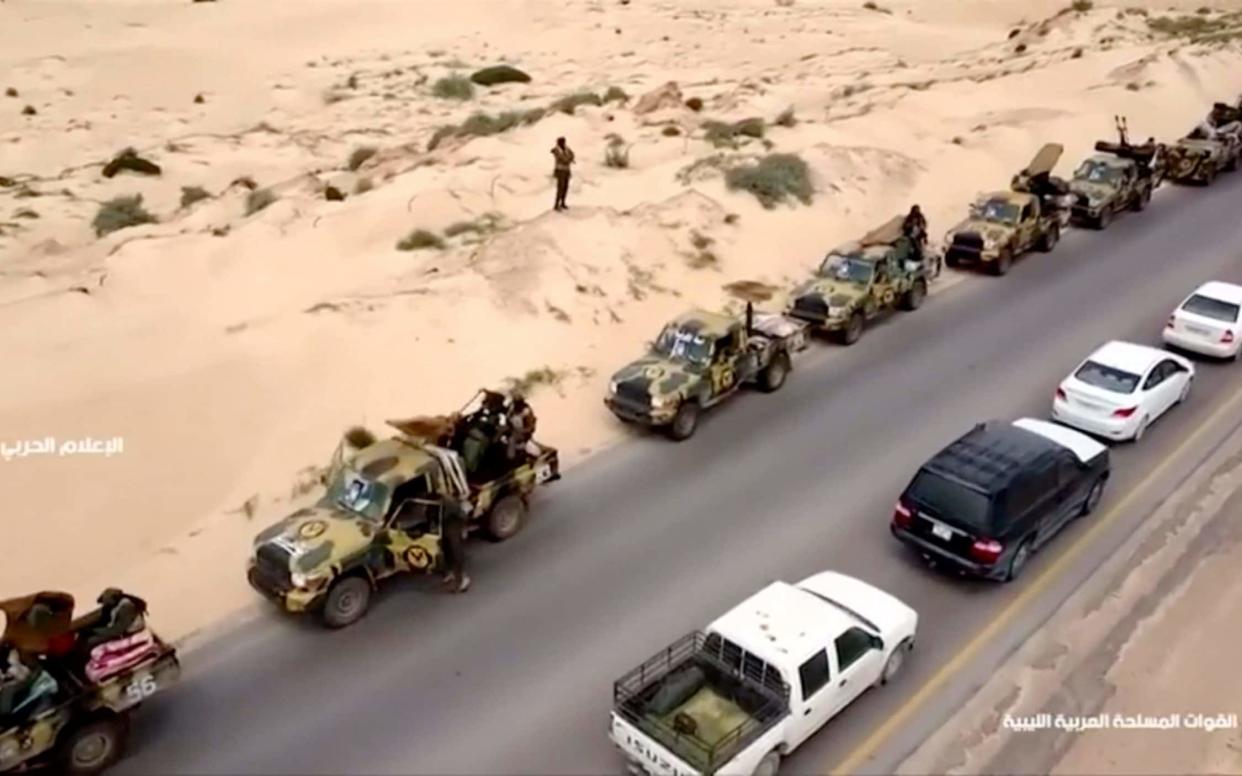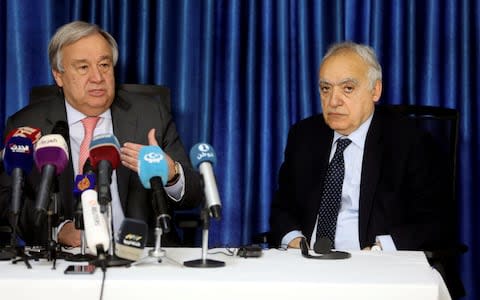Libya braced for war as Khalifa Haftar orders advance on Tripoli

Libya was on the brink of all-out civil war on Thursday after the renegade general Khalifa Haftar defied the United Nations to order his forces to march on Tripoli and overthrow the country’s internationally recognised government.
In an audio address to his self-styled Libyan National Army on Thursday evening, General Haftar ordered a "victorious march" on the capital to "shake the lands under the feet of the unjust bunch."
"Tripoli, we hear your call," he said in the address. "Whoever raises the white flag is safe."
Fayez al-Serraj, the prime minister of the Tripoli-based government of national accord, had earlier ordered forces mobilised and authorised airstrikes if necessary to halt any assault on the capital.
The powerful group of militias who control the Western city of Misrata said they were ready to fight Gen Haftar’s forces and backed Mr Serraj.
Gen Haftar’s attempt to end Libya’s long-simmering internal conflict by force came just hours after Antonio Guterres, the United Nations secretary general, arrived in Tripoli for talks with Mr Serraj ahead of a national reconciliation conference planned for the middle of this month.

Mr Guterres called for de-escalation and reiterated his view that there is "no military solution" to the country's eight-year conflict.
"There can be no national conference in these circumstances," he told reporters in the Libyan capital. Libya has been divided between rival armed groups since Muammar Gaddafi was overthrown in 2011.
The main centres of power are Mr Serraj’s internationally-recognised government based in Tripoli and a rival administration run by Gen Haftar based in the eastern city of Benghazi.
Gen Haftar has recently consolidated control over large swathes of the south of the country. He enjoys strong backing from Egypt and the United Arab Emirates, who see him as a potential secular leader who could restore order to the war-torn country and defeat Islamist insurgents there.
His critics see him as a would-be dictator in the mold of Gaddafi.
Russia and some Western countries, notably France, have also lent Gen Haftar support while simultaneously continuing to recognise and support Mr Serraj’s government in Tripoli.

Mr Serraj and Gen Haftar met in Abu Dhabi last month to discuss a power-sharing agreement and were expected to announce a deal paving the way to national elections at the Libyan National Conference organized by Ghassan Salame, the UN secretary general’s special representative for Libya, on April 14-16.
Skirmishes between the Gen Haftar’s forces and and troops loyal to Mr Serraj’s government broke out on Wednesday evening after the LNA said it had sent units westwards.
On Thursday morning, LNA units said they had taken full control of the town of Gharyan, about 50 miles south of the capital Tripoli.
The account was disputed by some witnesses who said LNA troops had bypassed the town rather than enter it.
The LNA released a video on Wednesday that showed pick-up trucks mounted with heavy machine guns massing on an unidentified road.
But analysts said it was still unclear whether Gen Haftar’s forces would have the military capacity to seize western Libya by force.
Although its troops saw intense fighting for control of the cities of Derna and Benghazi, most of the LNA’s recent territorial gains in the south of the country have been achieved by cutting deals with local militia groups rather than fighting them.
Western cities like Zintan and Misrata, which field formidable militias with heavy weapons, “would be a different type of resistance entirely. And they will fight” said Tim Eaton, a Libya expert at Chatham House. “It is difficult to see Haftar rolling into a place like Tripoli unless he has cut deals already.”

